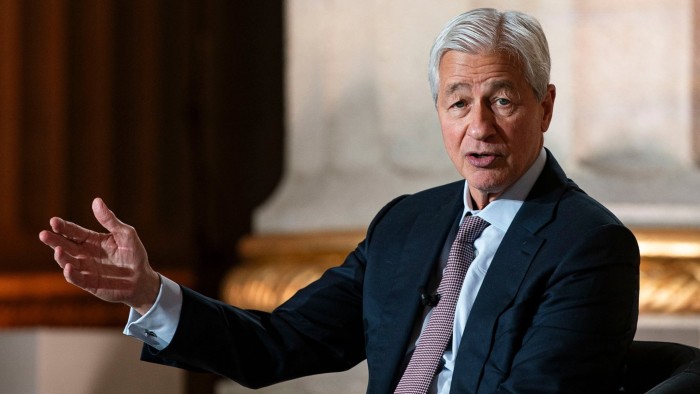Unlock the Editor’s Digest for free
Roula Khalaf, Editor of the FT, selects her favourite stories in this weekly newsletter.
UK chancellor Rachel Reeves has returned from a visit to the US last week determined to use recent positive economic data to talk up the British economy and counter continuing global doubts about the country’s attractiveness.
Reeves’ allies say meetings with finance chiefs and business leaders in Washington have convinced her that views of Britain remain clouded by recent political turmoil in the UK — including Brexit and Liz Truss’s “mini” Budget.
The chancellor has been accused by business leaders in the UK of making things worse with a £40bn tax-raising Budget and by sounding too gloomy, but Reeves’ team says she has a new determination to “talk up” Britain.
She has been boosted by an endorsement of her policies by Jamie Dimon, chief executive of JPMorgan Chase, who claimed the UK government’s economic reforms were making Britain a better place to invest.
Dimon, who has run the largest US bank for almost two decades, told the Financial Times: “I’ve always been a believer in the UK’s inherent strengths as a place to do business and there’s much to like about the new government’s pro-growth agenda.
“They have reinforced their commitments to an open economy, strengthening of infrastructure and the stability of markets — all of which is good for investor confidence.”
JPMorgan is a big employer in cities including London, Bournemouth and Glasgow, with a headcount of 22,000, up from 16,000 before Brexit. The increase has come in tandem with growth in the lender’s European operations.
Dimon’s comments came a few days after Larry Fink, chief executive of BlackRock, said his firm had been buying billions of pounds of UK assets it considered “undervalued”, and praised the government for tackling “some of the hard issues”.
Reeves’ new optimism offensive will be based on recent data across the economy, which has surprised analysts on the upside and with hopes of a fresh interest rate cut next week by the Bank of England.
“Britain is a stable, open economy in which to invest — some people haven’t caught up with that yet,” said one ally of the chancellor, who has described growth as the government’s central mission.
But the person admitted businesses and households were still struggling. Most of the data relates to the period before US President Donald Trump unleashed his trade war, which this month prompted the IMF to downgrade global growth forecasts and hit business and consumer sentiment.
Reeves, in Washington for the IMF and World Bank spring meetings, repeatedly stressed her backing for free trade as she proclaimed the UK’s attractions for technology, financial services and manufacturing investment.
But BoE governor Andrew Bailey struck a cautious note in Washington, warning that the central bank needed to “take seriously” the risks to growth from the tariff surge.
“Fragmenting the global economy would be bad for growth,” he said.
Traders are expecting another quarter-point rate cut when the BoE’s Monetary Policy Committee meets next Thursday, which would bring the benchmark rate to 4.25 per cent, a level last seen in 2023.
UK economic data predating the US import tariffs has generally been better than expected. The UK economy grew much more than forecast in February when it posted a 0.5 per cent expansion.
Inflation fell more than forecast to 2.6 per cent in March, from 2.8 per cent in the previous month, according to separate official data published this month.
Retail sales, the most recent measure of consumer spending, rose 0.4 per cent in March, confounding analysts’ expectations of a contraction and extending strong increases in the previous two months.
The GDP and retail sales figures suggest that the BoE March forecast of the UK economy growing by 0.25 per cent in the first quarter — up from 0.1 per cent expected in February — will probably prove pessimistic.
Economists expect the economy to grow 0.5 per cent in the first three months of this year, according to the latest Reuters poll.
Despite pressure from high living costs, household finances have continued to strengthen thanks to strong pay growth.
In the three months to February, regular wages adjusted for inflation rose at an annual rate of 2.1 per cent, according to official figures released this month. The increase marked the 21st consecutive month of earnings growth outpacing price growth.




